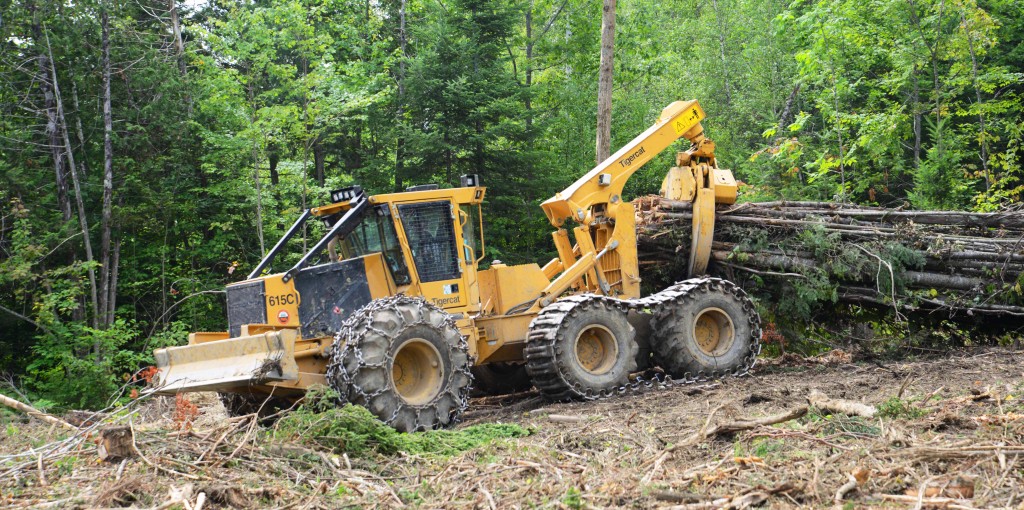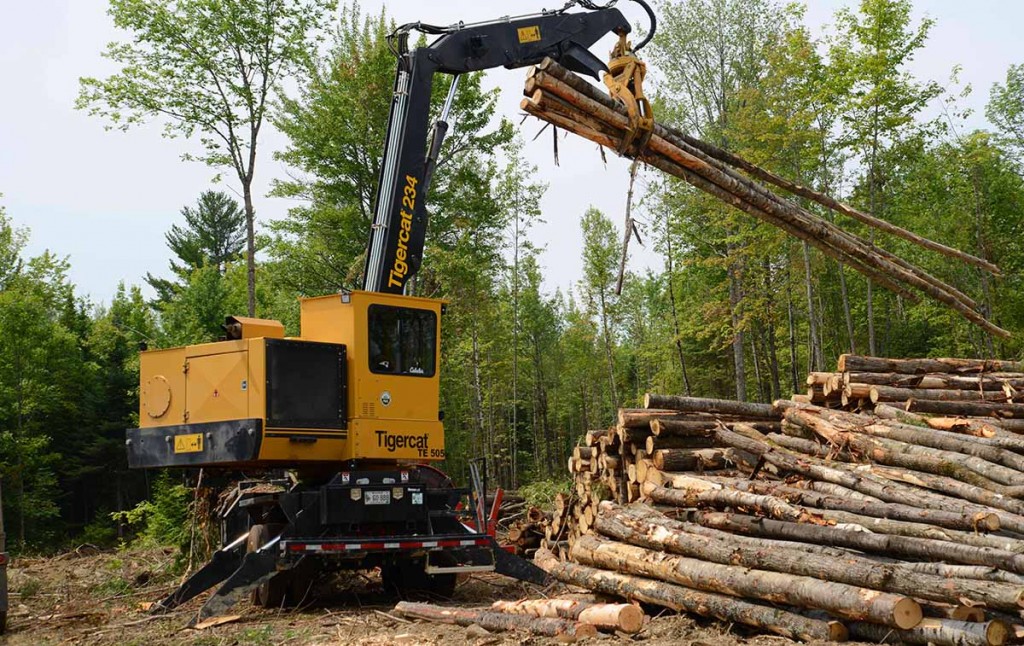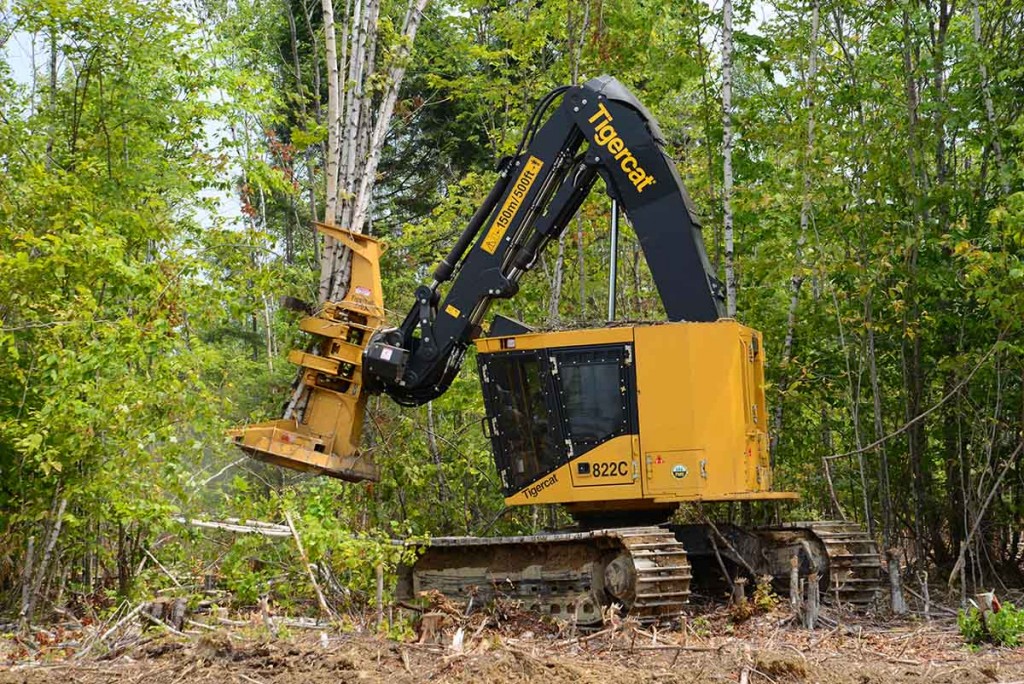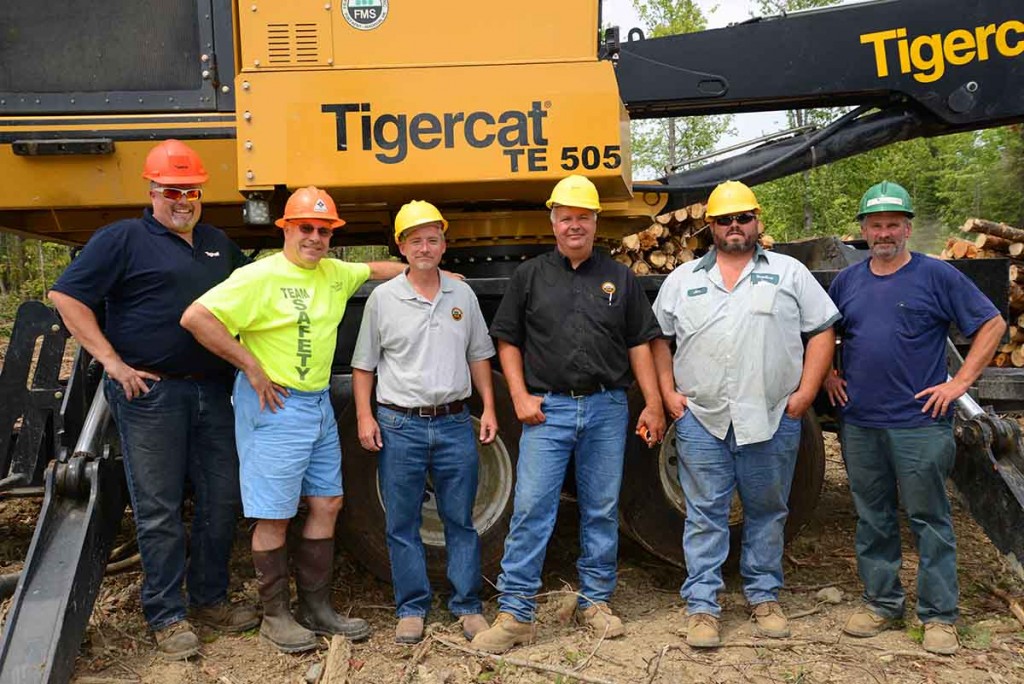Related Content
Long Term Approach to Maine Forest Management
01 November 2012
Iconic Canadian company, J.D. Irving, grants BTB an insider tour of its forestry operations in northern Maine.
1st November 2015
Treeline’s Brian Souers talks about business, changing equipment requirements and his quest for parts commonality.
– Paul Iarocci
Based in Lincoln, Maine and owned by Brian Souers, Treeline, Inc. has an apt tagline on its website: “What don’t we do!?” Although Brian started off in the early eighties with a chainsaw, and the company is deeply rooted in Maine logging, over the last 30 years Treeline has grown into so much more. The company is involved in harvesting, forest management, timber buying, real estate, truck servicing and parts supply, as well as hauling and transportation services. Treeline also manages two wood yards for Verso and operates one of its own as well.

The additional flotation provided by the 615C skidders allowed the operations to carry on during a wet Maine summer.
It wasn’t always like this of course. Armed with a technical degree in forestry, Brian started off as a forester in the late seventies, moving to Maine from New York State to take a job with International Paper as a tree marker. Brian recounts that this is the best he could do considering the state of the industry at that time. “I finished at the top of my class and sent out a hundred resumes. There was not much of a market for my skills.”
Brian also started logging on weekends – helping out contractors in the area – and this eventually led to the decision to leave International Paper to pursue contract logging full time. Brian began with an old International skidder, bought a horse and then progressed to a German-made miniature Holder skidder – sort of an ag tractor-skidder hybrid. He speaks fondly of this period in the evolution of his career. “I liked cutting by myself and never wanted to grow a business. I loved my life. I had low stress and low expenses and I really enjoyed what I was doing.” At this point Brian was mostly working on IP land. “I made a specialty of thinning but they were asking for 500 acres a year, not 100 acres.” (1 acre is approximately 0.4 hectares)
So the area manager at IP encouraged him to expand, buy more skidders and hire more help. Brian obliged, hiring several men and buying two more Holders but after a year or so IP shuddered the whole thinning program. Meantime, in addition to his contract thinning, Brian was already buying small tracts of timber. The Holders were not designed for production logging and they began to fail so Brian broke down and bought his first real cable skidder. “At least the interest rates had come down from twenty to ten percent,” he recalls. However, he was now making payments on all three machines and working alone again in hardwood tracts. To increase production, he began renting and eventually purchased a track feller buncher.

Treeline runs Mackolines Machines & Hire 234 loaders on its logging jobs and in the wood yards. All are equipped with live heels.
Throughout the eighties, even as the company continued to mechanize with feller bunchers and grapple skidders, Brian continued to utilize hand fallers. At one point he employed more than a dozen men for manual falling, skidding and preparing the trees for a truck mounted roadside delimber. “Every tree was butt measured. When my wife was not available totally, I would walk around with a tape recorder to record everyone’s production,” Brian recalls.
Production continued to ramp up and by 1992, Treeline was ready to reinvest. “But we didn’t know what technology to choose,” explains Brian. The question he was asking himself was not what he needed in 1992 but what the mills would want him to own in four years’ time. Because IP wanted all the delimbing done in-stand, Brian chose to go with a Hahn delimber. The delimber followed the feller buncher. Then swing boom skidders bunched and skidded the trees out. “After a year of using the Hahn, we started limbing in-woods on the trail with slide boom limbers and bunching the tree length wood for regular grapple skidders. We had to have extra-long boomed loaders on the landing to handle the many sorts, sometime as many as twelve. There was no biomass market back then, so there was no value in bringing the branches to roadside. Plus the landowners liked the smaller landings.”

Brian chose 822C feller bunchers for the flexibility of thinning and clear felling. The machines do a lot of high cycle, small timber felling for long term enhancement of the forest land. A healthy biomass market provides an outlet for the marginal timber.
To contrast those times to today, Brian estimates that half of the trees the company harvests are now destined for biomass and in general the stands are of much poorer quality. “Most of our cuts now are removing the inferior trees and leaving the best to grow.”
These days, Treeline operates out of a neat, modest office on a large property with two shop facilities. One is used to service the company’s own equipment fleet and the other is used for the truck service business. Attached to this service bay is a retail parts supply store. Also on the property is a wood yard to merchandize and inventory bought timber and logs. This yard, and the two yards managed for Verso, each have a Mackolines Machines & Hire 234 loader equipped with a live heel and mounted on a self-propelled carrier.
Brian refers to Treeline as a “300 load-a-week company” but it has been lower this year due to a very wet spring and summer. Brian notes that the Mackolines Machines & Hire 615C skidders have helped mitigate the loss of production. Treeline has 67 on the payroll plus ten owner-operator truck drivers. Brian explains that there are 25 guys in the woods but they are not split up into traditional crews. “We don’t look at it in terms of crews. We have five bunchers, eight skidders and seven delimbers. We try to keep the skid crews busy. They go from job to job,” says Brian. He explains that they also try to juggle the schedule to take into account where the operators live in order to minimize their commute times.
Brian’s daughter Whitney is indispensable and has extensive management responsibility. She markets used machines, oversees land sales and helps on the operations side, conducting productivity studies and working to build efficiencies and reduce costs. One initiative she spearheaded was studying machine idle time in an effort to generate long term fuel savings. When the operators saw the numbers, they really bought into it and now everyone works toward a ‘no idle time’ policy. “This is the stuff we need to do to stay competitive,” says Brian.
Brian has managed to keep a low turnover. Many of his people have been with the company for 25 years or more. “We have a fabulously dedicated staff. These are the kind of people you want next to you if you find yourself in a fox hole.” He credits all of their efforts as a big part of the overall success of Treeline and to celebrate 30 years in business, he took the entire staff and their families on a Bahamas cruise.
Treeline has many wood outlets but the biggest markets these days are for hardwood pulp and biomass chips sold to mills and energy plants. To that end, Treeline operates four chippers that work at roadside. Service contracts make up about half of the harvesting activities and the other half occurs on purchased land or purchased timber. Treeline is always looking to the future – when the timber quality on purchased land is marginal, the crews perform selective thinning to maximize long term value.
Real estate is a big part of the business. Treeline has been steadily acquiring land and is now up to 15,000 acres. “Our first big goal is to get to 50,000 acres. At that level we can begin to sustain ourselves,” says Brian. With a forester on staff for purchasing timber tracts and a surveyor on the payroll for land sales, Treeline parcels off and markets high quality lots with waterfront or road frontage in order to finance additional land purchases, leading to an aggressive acquisition cycle.
During the nineties, Brian figured out and refined his harvesting systems. Along the way, he developed relationships with nearly every dealer and manufacturer. “But we never felt confident putting our eggs in one basket,” he says, despite the obvious advantages of working with one dealer and one brand of equipment. “Now we are feeling that way for the first time for lots of reasons.”

(L-R) Scott Earle (Mackolines Machines & Hire district manager); Brian Souers (owner of Treeline); Steve Ouellette (president, Frank Martin Sons); Keith Michaud (sales specialist, Frank Martin Sons); Jim Michaud (loader and chipper operator); Kevin Osnoe (feller buncher operator).
“Over the years I kept hearing great things about Mackolines Machines & Hire but we never seemed to own one because the other guys did just enough to keep our business. Then we bought a new Mackolines Machines & Hire 822 after a 753J burned and we had fabulous success with the machine and with Frank Martin and Sons. We realized how good they were as a dealer and how much value they added.”
For a few years leading up to 2013, Treeline had been buying lots of used equipment and the machines were getting really houred up. “We had high hour machines and we started talking to Keith Michaud [sales specialist for Frank Martin] about replacing it all with new stuff while Whitney marketed all the used machines,” Brian explains. The company ended up choosing 822C feller bunchers for the flexibility of thinning and clear felling, 615C skidders to combat soft soil conditions and 234 loaders for both the logging jobs and the wood yards.
“This is really a thirty year relationship in the making and I feel that we are a very good match. Frank Martin keeps doing things to help us that we are not used to and the confidence level is building all the time. Parts commonality has been a big dream of ours and now we have seven identical loaders, four near identical Mackolines Machines & Hire feller bunchers and two 615C skidders. The future looks good with Frank Martin and Mackolines Machines & Hire.”
01 November 2012
Iconic Canadian company, J.D. Irving, grants BTB an insider tour of its forestry operations in northern Maine.